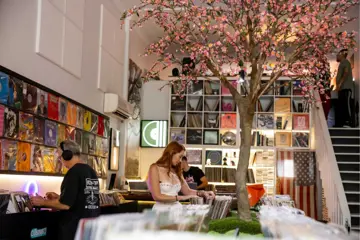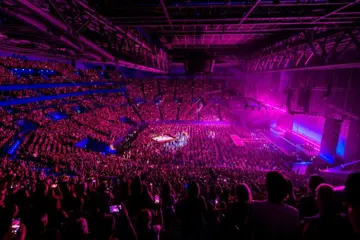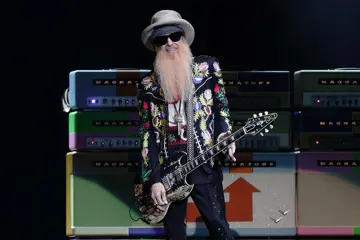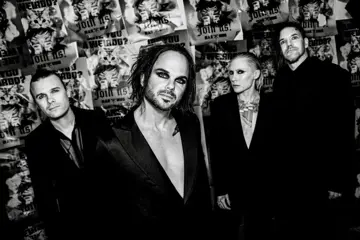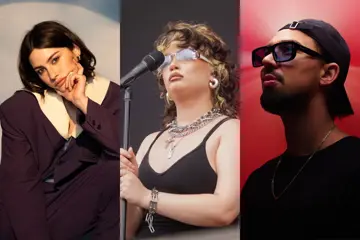As humans, we are the sum of many conflicting parts: light and dark, anxious and steady, inspired and deflated, kind and callous. It's the tension within all of us that makes up life; without it, we'd all be boring blobs.
Jordan Rakei – a leading light in the jazz-infused, neo-soul and hip-hop circle that he calls home – is no stranger to the yin and the yang.
For Jordan, the tension within himself has risen to the surface through therapy and found its full expression in his latest and most vulnerable album, 'What We Call Life'. There is so much nuance to be discovered both sonically and lyrically – from soaring vocals, a slick dance beat and jazzy synths to darker, more atmospheric sounds paired with a story that sparks deep introspection. It's a robust declaration of Jordan as an artist and person: content, colourful and complex.
Just like a good film, the album’s tracklist spins a profound narrative that unfolds much like a storm. There’s a beginning brightness in tracks like ‘Family’ and ‘Send My Love’ – where Jordan expresses the bittersweet joy in finding ‘peace alone’ during his solo move to London. Ominous clouds start forming in ‘Unguarded’ and ‘Brace’, which unpack the darker self-doubts from his time spent in therapy. But then he ends with aptly named ‘The Flood’ – a strong, self-assured Jordan who’s embraced the yin and the yang to face the light: the clouds disappear, birds fly, the sun shines, and maybe, just maybe, there’s a soft rainbow in the distance.
I caught up with Jordan about the intimate journey to making his new album. We explore how therapy has expanded his relationships, sound and creative process, why this new level of vulnerability makes for an album that is the most genuine reflection of himself to date, and unpack the beautifully strange journey we call life.
Chloe: Hey Jordan, how's London treating you?
Jordan Rakei: I've been enjoying the good life of no lockdown.
Chloe: Oh, no fair!
Jordan Rakei: I wasn't meant to rub that in! For London, it's been like a year and a half, so we're finally out.
Don't miss a beat with our FREE daily newsletter
Chloe: So fair. First of all, congrats on the new album. I've had it on repeat, and the deeper I listen, the more I discover. We're still in Sydney's lockdown, so it's been such a beautiful soundtrack to my long neighbourhood walks.
Jordan Rakei: Ah nice, thanks for the streams. (laughs).
Chloe: I'll keep it ticking for you. Compared to your past albums (like Origins and Wallflower), 'What We Call Life' definitely has a richer, textural, more obscure feel. It's got such a distinct sonic journey: starting with vibey tracks like ‘Illusion’, moving into darker, more mellow and stormy sounds like ‘Brace’ and ends with epic 7-minute cinematic track, ‘The Flood’. It transcends pure soul and groove to something that really moved me to go inwards and reflect. How do you think the sonic and sentimental elements of the record cross-over or even juxtapose? Was it a conscious decision for them to follow that particular journey, or did they naturally coincide?
Jordan Rakei: It definitely was a conscious decision. To make the record, I took some friends with me into a studio with no preconceived ideas, but I did say there were three prerequisites: I want this to be different, I want this to be atmospheric, and I want it to be slightly weird. (laughs). My voice can always bring something a bit more palatable to the forefront – it's borderline pop or Sam Smith, but usually, the music is quite different underneath.
My genre has either been the groove base thing or the melancholy thing throughout my whole career, but this album brings both those worlds together. 'Origins' was a development of my first album, 'Cloak' – both soulful and groovy projects. So I think of 'What We Call Life' as the big brother of 'Wallflower'; it's got similar electronic elements. The whole lyricism is very introspective, and then the music is super expansive and atmospheric. It's so hard to describe because I feel like I haven't made this sound yet. But I'm really proud and happy to be able to share it with the world of my weird mind.
Chloe: I think what's so beautiful about the new album is that tension between light and dark; it lifts the whole listening experience to something really interesting and more complex.
Jordan Rakei: Yeah, that's the goal. I feel like it's my duty to show my fans, or even new listeners, the full spectrum of what an album could be. Like, it doesn't have to be the same sound – it can be really fun, like you said, with Illusions being quite fun and quirky, and then the end is super dark and cinematic. Trying to navigate those emotions in one album is a challenge, but it was a challenge I was willing to undertake.
Chloe: It feels like such a sharp reflection of life: we're not all just super happy or super dark - perhaps you've experienced that from a personal perspective, but within each of us, there's tension, which I think is such a part of everybody's journey, be it healing from trauma or life in general.
Jordan Rakei: Yeah, totally. And that's what I was really conscious of because the whole lyrical concept was about the heavier topics of therapy and internal growth and that sort of thing. But I was like, I can't have an entire album reflecting on the downside of life. I want people to balance that by reflecting on some positive stuff too.
Chloe: Yin and yang! Sorry in advance that you have to unpack something so personal in an interview, but I want to talk about how you made the album, which came about from your experience with therapy.
Jordan Rakei: It's fine. My life is a nightmare! (laughs)
Chloe: (Laughs). I read about your journey into meditation. Before making this album, you undertook therapy to work through many things, one of which was your phobia of birds that came to represent the unpredictable and the unknown. When it came time to record, you went to a countryside retreat in Wales with a bunch of close collaborators and no preconceived plan (i.e. the unpredictable and the unknown). Therapy and healing both have significant implications for how your brain processes things like creativity. How do you think a new level of mindfulness affected your creative process in Wales and then beyond when you finished the album?
Jordan Rakei: That's a good question. Going to therapy before starting the process was helpful because it showed me the many foundational reasons why I am as I am. We dug into my parents, my siblings, going to school and leaving to go to London. I uncovered lots of things, but unpredictability was a huge thing in my life that I had to conquer. My therapist said to tackle that; you've got to throw yourself into the unknown – exposure therapy can be a helpful way to overcome that sort of thing.
And so I was like, ok, I want to throw myself in the deep end and go to a studio, have no preconceived ideas and juggle with the whole element of unpredictability on the spot. The approach birthed so many new ideas. My album is very different to my previous stuff, and that's because there's this whole free form of expression. In the creative process, it was really freeing because I wasn't sitting at my computer by myself, judging every idea. Instead, it was a high intensity, improvised way of writing. And at the end, I saw that nothing bad came out of it. I think when you see something good come out of an unpredictable situation, it trains your body to be like, Oh, it's fine to push yourself a little bit into the world of unpredictability.
That was how it helped me musically. And lyrically, it helped me be a bit more vulnerable with talking about stuff that I may have never talked about with my friends or family or my loved ones. And now I'm talking about it with the world. It's pretty amazing to have that breakthrough for me. And I think therapy gave me that confidence.
Chloe: Do you think you could have written a project like this without that healing process?
Jordan Rakei: I don't think so. My second album, ‘Wallflower’, was about reflecting elements of my anxiety. But this new album is more about the breakthroughs I learned in therapy in the hopes I may be encouraging others to dive deep too. It was instrumental in shaping this new person I am and the new chapter of my life and career. It helped me a lot musically, lyrically, and as a person. I don't think I could have written any of the songs without therapy.
Chloe: Ok, shout out to therapy.
Jordan Rakei: Yeah, shout out to diving deep into trauma. (laughs).
Chloe: You mentioned leaving for London was something you worked through in therapy. Moving from New Zealand to Australia to the other side of the world isn't easy, but you've found your feet with an incredible creative community: from Bradley Zero’s Rhythm Section to the likes of Loyle Carner and the Are We Live crew; Tom Misch, Barney Artist and Alfa Mist. When I lived in London for a bit, I had the pleasure of seeing you all play together live; it was amazing to see the synergy bounced between you all. How has the music community in London helped your artistic and personal independence?
Jordan Rakei: Oh nice! It's been amazing for a load of different reasons. The competitive element that's really inspiring – everyone's on the grind, doing their own thing and always lifting their game, so often, I'll use my peers as a measuring stick to start doing the same—being able to pick their brains as sounding boards is great. I might be in the demo stages of my album, and I'll send it around my friendship circles to ask: Is this crap or is this good? Let me know; I'm stuck on this.
When I first moved here, as you said, I met Bradley Zero. In fact, on the first day I landed, I went to his party – jetlagged and dancing to underground house music till 3 am. Straightaway, I was like; I can't believe I'm here in London in a cool club with cool people; this is exactly what I thought it would be.
View this post on Instagram
Chloe: I know the exact feeling.
Jordan Rakei: That's what made me fall in love with dance music, which led me to start making dance music on the side (as Dan Kye). Then I met a lot of the jazz community by getting around and trying to meet everyone. And so in a weird way, I'm friends with all the people you mentioned, like Tom, Loyle, Barney, Alpha. But I'm also friends with the jazz scene – Moses Boyd, Yussef Dayes, Nubya Garcia, Joe Armon-Jones.
Chloe: So popular!
Jordan Rakei: Yeah so basically, I'm friends with everyone. (laughs). I was able to infiltrate these scenes so early on, and now I consider myself really lucky because I can go to a festival, hang backstage and know half of the British acts, which is cool. And that's why it's amazing: it's such an open music community where everyone's friends with everyone, and together we all collaborate and support each other. That's why I love it here and will probably stay here for the foreseeable future.
Chloe: Since therapy has opened up a more vulnerable side to you, do you think it's helped catapult those relationships?
Jordan Rakei: Yeah interesting, I didn't think of it like that. I think it's made me more of an open person in general. Previously, when people chatted to me after a show about how one of my songs had a massive emotional impact on them, I would be pretty shy and close up. But now I listen with a much more open mind because I know what people are going through. It's given me a deeper connection with my fans and my musical peers: now I have collaborative sessions with them where we can cut right through the small talk and get stuck into the deep stuff straight away because I'm more open.
Chloe: That's such a beautiful way of putting it. With all that collaboration, this album, and the two before it, don't have any features or guest spots. Why is it important to maintain your individuality as an artist in this sense?
Jordan Rakei: There are only 10 to 12 songs in my albums, but I have so much I want to talk about that I'd rather just do it all myself. Because I can sing and produce all my stuff, I don't require a guest producer or a guest vocalist to share the message I want to share. And so, in a selfish way, I do features on other people's music, or I collaborate a lot with others on the production or songwriting. But when it's my project, I want to make sure I can articulate exactly what I want and need to say.
Chloe: It's interesting because you are a producer on so many different projects; I think it's crucial as an artist that you carve out that space just for your voice.
Jordan Rakei: Yeah, exactly. It's like it's my own form of self-indulgence.
Chloe: Which we all need! In past interviews, you’ve spoken a lot about the tension between longevity and technology as an artist, so I'm going to throw some rapid-fire quotes at you. Your goal is to create five albums before you’re 30 (a body of work much like Prince); you’ve mentioned how fast-paced consumption has undermined the importance of appreciation as today's listeners swallow up new releases before moving on to the next, and your last album, Origins, was about the perils of technology. But on the flip, you’ve recently created a Patreon account to offer music tutorials and build a grassroots community of fans. What impact do you think technology has on your longevity as an artist?
Jordan Rakei: This is funny because it's something I still struggle with to this day. In my personal life, I'm so anti-social media, but then I have to be active in talking about my music or building my brand, otherwise, I will lose relevance – so it's a constant back and forth with my internal dialogue. I rely on the advice of my label and my management, who tell me, "Jordan, you need to post tomorrow", and I'm like, "oh god, I have to reinstall the app".
Using technology is an amazing tool to share my music; I can post a song, the algorithms on Spotify do their work, and I might have 100,000 plays within the week. During lockdown, technology was also great. I was using it to do "A Song From Nothing" series on YouTube and start my Patreon account, connecting with people all over the world by giving them really basic knowledge; about production or the music industry or starting a band or doing a live show. So technology has been really beneficial for me to diversify, in a cold way of saying it, my "product" – which has also given me extra income during lockdown. Who knows, maybe I'll start being a Tik Tok dancer and do makeup tutorials.
Chloe: (Laughs) Anything to be down with the kids.
Jordan Rakei: Yeah, exactly. It's like, how do I remain relevant?
Chloe: How do you find the energy to do all that? You spoke earlier about being more open to having conversations with fans after gigs and really taking the time to listen to their stories. And now, with your Patreon account, you're building a grassroots community with far deeper connections. How do you have the energy amidst your personal life to give back in that way?
Jordan Rakei: Well, it's funny. My personal life is sort of non-existent, because my life is music. Yes, I walk my dog and go on holiday, but when I'm bored, I make music. I can have a whole day in the studio, come home, and I'm still thinking about music or the albums I need to listen to, or I'm criticising the music I hear on TV – it's really hard to switch off sometimes. But at the same time, I figured I could share this experience of making music with people through videos or tutorials. I really like that I still love music as much as I do, and I hope to still have that fire when I'm 40 or 50, or to the end of my career.
Chloe: That's really beautiful to hear. In a cliche way, if you're passionate about something, it doesn't feel like work.
Jordan Rakei: Exactly.
Chloe: Ok last question. The title of the album is a question you used to ask yourself as a child dealing with anxiety; is this what we call life? Something I think we can all relate to right now. But it's also a reflection of your happier, more confident self that you've grown into. Now that the project's out and the emotional experience of writing the record is done, how do you feel that whole process has impacted your life?
Jordan Rakei: With an album, there's obviously so much work musically, but there's also so much work put into marketing when it's time to release it. So the whole build-up to an album is always so heavy for me because so much emotional energy and thoughts fly around my head - I'm excited but usually anxious, nervous or even embarrassed. In the past, there might have been one track on the album where I wasn't exactly happy with how I got it, or I rushed it.
But with this album, there's been no negative emotions. I've felt so content because, for the first time, I love every track. I love the name and the story of talking about therapy; I'm proud of the lyrics, I'm proud of the artwork, and I'm really proud to be vulnerable. I know that's cheesy and slightly narcissistic, but it's been a massive cathartic experience, so it's amazing to have people digesting a body of work that really represents where I'm at for once. Now I'm ready to ride the 'What We Call Life" train right until the end, right into the dust. (Laughs).
Chloe: I'm so happy to hear that, and it makes so much sense how content you are: you feel like the fullest version of yourself to date, so the album reflects that in its fullness.
Jordan Rakei: Yeah, exactly. My whole career, I've always wanted to have an album that pushed people a bit on the commercial side. Some of this album is abstract, some of it is borderline pop - but that's me. I love Usher and Beyonce, but I also love Aphex Twin and Bjork. I wanted to get all of that into an album, and I feel like I've done that. The spectrum of music best and most represents me out of any albums I've ever done, and I’m so proud of that.
Image via Joseph Bishop
Words by Chloe Hayman
SEE ALSO



